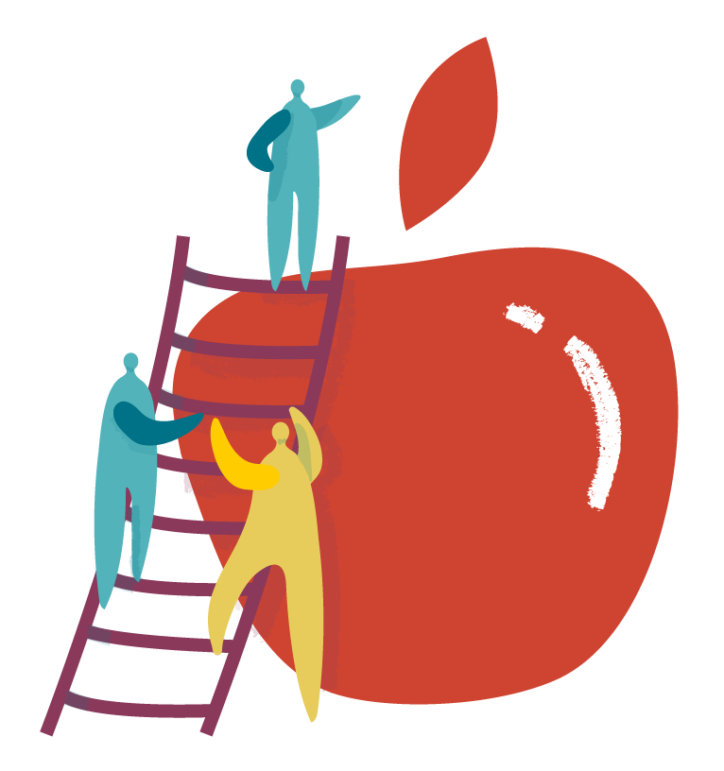
Mindapples encourages and supports everyone to take care of their minds. We provide education, training, apps and e-learning that teach people how their minds work and help them manage their mental health and wellbeing. By doing this, we hope to make looking after our minds as natural as brushing our teeth: something normal and habitual for everyone.
There are various strands to our work, each with connected objectives:
- The Mindapples campaign, our overarching public mental health intervention, helps people understand and take care of their minds. We do this through events, pop-ups, public talks and festivals, and digital interventions like apps and social media campaigns.
- Our workplace services help people work smarter and more sustainably, improving wellbeing at work and promoting productive, sustainable working through enterprise e-learning and workplace training programmes.
- Our projects and programmes help people at key life stages to manage their minds, from young people doing exams and entering or leaving university, to supporting people in healthcare or mental health services.
- Our champions programme supports people in charities, education and healthcare to promote public mental health and wellbeing, and take better care of other people’s minds, through professional training and grassroots volunteer support.
- And we’ve launched the Mindapples for Schools programme, which supports teachers, parents and pupils to take better care of their minds, and develop whole-school approaches to promoting mental health and wellbeing.
All these diverse elements are delivered by our small organisation thanks to the enthusiastic support of our volunteers, trainers, funders and clients.

What we do makes a difference
Many studies suggest that we have a considerable influence over our mental state through our day-to-day actions. Basic physiological factors like getting enough sleep, taking exercise and drinking enough water (Sleep Matters, Mental Health Foundation, 2011; Fox, 1999; Armstrong, Ganio et al, 2012) can have a big impact on our mental health, reducing the risks of illness and giving us the mental resources to manage our health better. Psychological factors make a big difference too. Lack of friendships can have a similar impact on our life expectancy to smoking, drinking and obesity (Holt-Lunstad et al, 2010). Making time for enjoyable activities can decrease levels of depression (Lewinsohn & Gotlib, 1995) as well as preventing the initial onset of depressive symptoms (Munoz, Ying, Armas, Chari & Guzza, 1987), whilst integrating “breathers” and “restorers” into our daily lives can help us maintain our mental wellbeing and prevent problems before they occur (Pressman et al, 2009; Jansen & von Sadovszky, 2004). The Department of Health even estimates that as many as 50 per cent of mental health issues are preventable (Flourishing People, Connected Communities, Department of Health 2009). The message is clear: we need to take better care of ourselves.

Putting people in control
Having a sense of control and autonomy can be good for our mental health. People who have, or believe they have, little control over their lives often tend to be more prone to stress, anxiety and depression (Benassi, Sweeney & Dufour, 1988), and we are also more likely to experience positive emotions when we perceive ourselves as being in control, and when we share events with others (Bryant, 1989; Langston, 1994). People who have a sense of control over their lives are also more likely to seek out health information and engage in preventative behaviours such as wearing seatbelts and going to the dentist for check-ups (Strickland, 1978), and are also more successful when trying to lose weight, reduce smoking and adhering to medical regimens (Wallston & Wallston 1978). This means mental health requires a different approach to many public health issues. Telling people what to do and placing all the decisions in the hands of the experts is actually quite bad for us. Mindapples taps into these effects by emphasising individual choice and autonomy and encouraging people to share their own experiences. Our question-based, educational model reinforces the positive actions people already take, and avoids debilitating expert-led models of treatment and prescription. This approach is designed to build awareness, increase self-efficacy, and give people more sense of control and responsibility for their mental health and wellbeing.

Knowledge is power
Too often, our approaches to medical and public health initiatives focus too much on clinical interventions and not enough on other tools for social change such as education. By teaching people how their minds work, Mindapples aims to reduce people’s uncertainty and fear around this topic, help people identify what help they need and support other people better, and improve people’s understanding of their lives.
Our education and training work focusses on sharing agreed insights from experimental neuroscience and psychology to help people manage their minds better, maintain their health and achieve their goals. And the early evidence we’ve been collecting suggests that this approach really works, improving people’s wellbeing, resilience, self-efficacy and ability to mentalise – in both healthy and clinical populations.
We’re always keen to discuss the evidence behind our approach and improve the general level of understanding about these issues in policy, clinical practice, workplace health and society at large. To discuss the evidence behind our work and explore these issues with us, contact us at research@mindapples.org.
A mainstream campaign
Most mental health interventions are aimed at people who want to self-improve, or have already experienced mental illness, but real change comes from shifting mainstream opinion. Changing how we talk about this stigmatised topic, particularly amongst people who have no interest in or connection to mental ill-health, could have a significant impact on our collective mental health. Our strategy for achieving mainstream culture change is to accentuate the positive and build an attractive image of good mental health that everyone can move towards. And since people are 90% more likely to trust recommendations from people they know (Nielsen 2009), we do this by collecting and sharing stories about what people are doing for the good of their minds, to build a positive culture of mentally healthy living for everyone.

